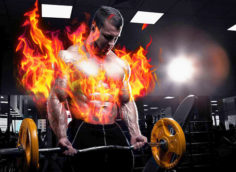Protein is more filling than fat or carbohydrate. Studies show that protein is the most satiating while fat is the least satiating. Carbs fall in the middle.
Protein has an influence on CCK (cholecystokinin) and ghrelin. Protein may stimulate CCK and decrease ghrelin. CCK acts as a satiety signal. Ghrelin is produced primarily in the stomach and has appetite increasing properties. Ghrelin levels are relatively high prior to a meal and they decrease after a meal.
- A review published in Nutrition & Metabolism reported that protein induced thermogenesis has an important effect on satiety. "Protein plays a key role in body weight regulation through satiety related to diet-induced thermogenesis."
- A study published in Physiology & Behavior investigated the relative satiating effect of the macronutrients in lean women. On four separate occasions, the composition of an iso-caloric lunch "preload" was controlled in 12 lean women. Macronutrient composition had a significant effect on short-term hunger – the women were less hungry after the protein preload compared to the preloads with the other macronutrients. They also ate less after the protein preload.
- A study published in the American Journal of Clinical Nutrition tested the prediction that increasing protein while maintaining the carb content of a diet lowers body weight due to decreased appetite and decreased calorie intake. The study showed when increasing the protein intake from 15% of diet to 30% of diet (while eating the same amount of carbs) there was a decrease in appetite and fewer calories were consumed.
- The Journal of Clinical Endocrinology & Metabolism published a study that compared the effect of different proteins and carbohydrates on indicators of appetite and appetite regulatory hormones. CCK level was one of the primary outcomes measured. Calorie intake was higher after the glucose preload compared with lactose and protein preloads. CCK level was higher 90 minutes after the protein preloads compared with glucose and lactose level. Researchers concluded that "acute appetite and energy intake are equally reduced after consumption of lactose, casein, or whey compared with glucose."
- Westerterp KR. Diet induced thermogenesis. Nutr Metab (Lond). 2004;1:5. PMC.
- Poppitt SD et al. Short-term effects of macronutrient preloads on appetite and energy intake in lean women. Physiol Behav. 1998 Jun 1;64(3):279-85. PubMed.
- Blom WAM et al. Effect of high-protein breakfast ont he postprandial ghrelin response. Am J Clin Nutr. 2006 Feb;83(2):211-20. PubMed.
- Bowen J et al. Energy intake, Ghrelin, and Cholecystokinin after Different Carbohydrate and Protein Preloads in Overweight Men. J Clin Endocrinol Metab. 2006 Apr;91(4):1477-83. PubMed.





